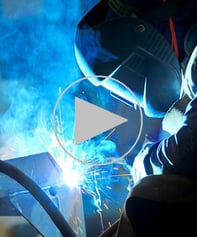Improving Higher Education for Low-Skilled Adults through Accelerating Opportunity

The following interview is with Harmony Little, the Project Coordinator of the Accelerating Opportunity initiative with the Kentucky Community and Technical College System. Little discusses Kentucky’s involvement with the Accelerating Opportunity initiative—which seeks to change the way education is delivered to lower-skilled adults by integrating basic skills with occupational training, and providing intensive support for adult learners looking to be successful in high-skill careers—and explains some of the strategies the initiative uses to overcome major challenges faced by low-skilled adult students in higher education.
1. Why did Kentucky decide the Accelerating Opportunity initiative was worth being a part of?
Well we just saw it as a wonderful opportunity to be aligned with, not just a national movement that really works to help low-skilled adults get the credentials they need for a well-paying job, but really aligned with work we were currently looking at doing ourselves in the state.
Nation-wide we have a lot of lower-skilled adult workers or potential workers that don’t have the educational skills to go out and get a family-sustaining wage, and the existing path for most of those is very long to get there. So, when we were already involved in the predecessor initiative to this called “Breaking Through”, and saw successes with that initiative -it focused on accelerated pace of learning, strong support services, realignment of programs and labor market payoffs. And we did that [initiative] at three of our 16 of colleges here in the state of Kentucky. So for us this was just a natural extension on work we had already started, so we were thrilled to be one of the four original colleges elected through a competitive RFP process to be part of it.
When I say colleges, it’s actually broader than that because in Kentucky it’s not just the community colleges that are providing the service, we are also partners with Kentucky Adults Education and Kentucky Career Centers, but most of the services are taking place at the college but it wouldn’t happen without those other partners as well.
So, instead of students coming first maybe to adult education and then finishing up there and then hopefully transitioning to the college but most likely being placed in developmental courses, spending some time there if ever even finishing and then going on to the technical courses, we saw this as a great way to tap into an audience that we could speed up that time for them and maybe between six months to a year, be able to get them into a job as opposed to several years in certain cases.
2. What are some of the challenges that lower-skilled adults face when they enroll in higher education?
Well some of those challenges are that they’re not being “college ready” for a lot of different reasons. Community colleges attract a wide number of students, though, it’s not just your traditional students who’ve just finished high school and then is going on to get their post-secondary degree. We have folks who may not have finished high school come to the college. We have folks who have been out of school for a long time. We have people who have been in the workforce for a long time. We have people who have been out of the workforce.
So a lot of those folks for whatever reason when they come to us are not deemed to have the reading, writing or math skills necessary in order to complete their degree or the pathway that they are pursuing. So, one of the major challenges is that around 70 percent of those who are coming to our colleges are required to go into developmental education. Not only does that take resources to participate in those developmental education programs, it also takes time before they can actually pursue the pathway and degree they came to the college to do in the first place.
3. Does this initiative avoid the remedial and developmental programs? How does the initiative help students overcome those challenges of being prepared for college-level work?
It doesn’t avoid it for them, it just pairs it at the same time. So what happens in the Accelerating Opportunity initiative -which was based out of a successful program, I-BEST, out of Washington state- is that we pair those two things at the same time and “accelerate” the learning experience for the student. We are allowing the low-skilled students to sign up and take college-level technical courses that, while they are in that classroom with the technical instructor, there’s also an adult education instructor in the classroom working on the math, reading and writing skills that’s necessary. Not just so that they can master the skills needed for that course that they’re enrolled in, but also just to help them with their basic skills in general.
That takes place in the classroom, so it’s the exact same curriculum that any regular student would receive in a technical course, in that it’s assisted or there’s a team teacher from adult education at the same time focusing on those basic skills. And then, those students are receiving additional remediation from that adult education instructor that’s with them in the technical classroom, outside the classroom and most of that material is contextualized.
So a good example is, you have a nursing student who’s is in Accelerating Opportunity and when they’re meeting with their adult education instructor—whether they are working on math problems or reading—it’s all around the field of nursing. So they can apply the basic skills that they’re learning to the technical curriculum that they are enrolled in.
4. Why is it important for higher education institutions to take immediate action in supporting the education of lower-skilled adults?
A number of studies have come out recently that shows by 2018, over 60 percent of jobs in America are requiring some type of post-secondary skills. Not necessarily a two-year degree but at least some entry-level certificate to demonstrate that they have the skills needed in today’s workforce.
So there’s a huge gap, you’re constantly hearing in the news that we have a high unemployment rates, but what we also hear from our employers is that we don’t have the skilled workforce. So, this is a prime opportunity for us in the community college sector to try to address those immediate issues that are going on around our country and try to get folks who are interested in jobs into a career that then they can come back to the college and build on and advance not just their education, but also their career.
5. Do you have any final comments on the importance of the Accelerating Opportunity program and the direction that Kentucky’s community colleges are going in?
Sure, I’d just like to share that we are eight months into the program now, we started it January of this year, and we’re already seeing some wonderful early successes from the eight colleges that were part of the phase one of this initiative.
We are seeing a lot of these lower-skilled students earn the credentials that they signed up for and either going out and getting a job, but almost equally exciting, we’re also seeing many students continuing on beyond that entry-level certificate., Because what’s happening is these folks are realizing that they have the ability and skills to be college students and they make the connection that the fact that, “If I pursue a higher degree than that can connect to a better job of opportunity in the future.” So we are really excited to have some early successes and actually see what we thought would happen, happening.
Author Perspective: Administrator



